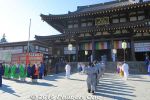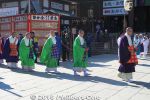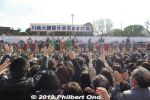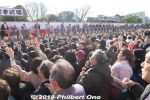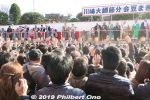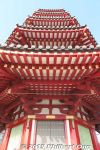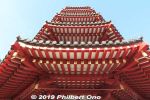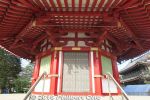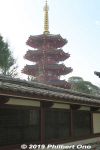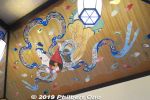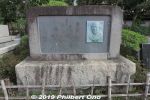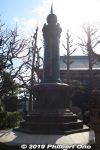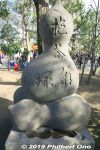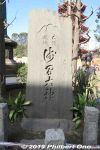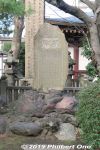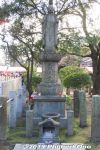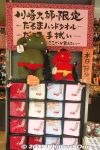 Image search results - "daishi" Image search results - "daishi" |

Belonging to the Shingon Sect's Buzan school, this is one of Tokyo's major temples. The real name is Sojiji (總持寺), but everyone calls it Nishi-Arai Daishi.The temple grounds feature many flowering trees and plants including an unusual species of cherry blossoms which bloom in winter. Daishi-mae Station. Much larger station than I expected. Probably for the New Year's crowds. 大師前駅
|
|

Daishi-mae Station 大師前駅. Nishi-Arai Daishi Temple was said have been founded by Priest Kobo Daishi in 826. One of the Kanto Region's Big Three Daishi Temples.
|
|

The main path to the temple is lined with the usual shops, but it is not aligned with the train station. The path from the train station takes a different route.
|
|

Main path to temple
|
|

Sanmon Gate, the main gate. 山門
|
|

Sanmon Gate
|
|

Food stalls lead you to the main worship hall.
|
|

Dai-Hondo Hall, Nishi-Arai Daishi, Tokyo 大本堂According to legend, when prayers were offered to save villagers from an epidemic, pure water gushed out of a hitherto dried-up well and got rid of the plague. Since the well was on the west side of the temple hall, this area came to be called "Nishi-Arai" (New Well in the West). The temple is famous for warding off fire and misfortune.
|
|

Incense burner
|
|

Lantern
|
|

Dai-Hondo Hall 大本堂
|
|

Altar inside Dai-Hondo Hall 大本堂
|
|

View from Dai-Hondo Hall
|
|

Winter-flowering cherry blossoms
|
|

Winter-flowering cherry blossoms and Dai-Hondo Hall
|
|
|

Winter-flowering cherry blossoms, Nishi-Arai Daishi, Tokyo 寒桜
|
|
|

Winter-flowering cherry blossoms 寒桜
|
|
|
|
|

Winter-flowering cherry blossoms 寒桜
|
|

Winter-flowering cherry blossoms 寒桜
|
|

Ume plum blossoms
|
|

Ume plum blossoms
|
|

Ume plum blossoms
|
|

White plum blossoms
|
|

White plum blossoms 白梅
|
|

White plum blossoms 白梅
|
|

White plum blossoms 白梅
|
|

Red plum blossoms
|
|

In spring, see 4,500 peony plants in 70 varieties bloom. Temple is nicknamed "Botan Daishi" (Peony Daishi).
|
|

Red plum blossoms
|
|

Red plum blossoms and pagoda
|
|

White plum blossoms
|
|
|

Pond behind the Dai-Hondo Hall
|
|

Waterfall
|
|

Koi
|
|

Benten-do 弁天堂
|
|

如意輪堂
|
|

如意輪堂
|
|

Side view of Dai-Hondo
|
|

Side view of Dai-Hondo
|
|

13-story pagoda 十三大塔
|
|

Chigo Daishi 稚児大師
|
|

Chigo Daishi 稚児大師
|
|

Three-story Treasure Pagoda 三重宝塔
|
|

水子地蔵
|
|

水子地蔵
|
|
|

Salt Jizo 塩地蔵
|
|

Salt Jizo 塩地蔵
|
|

Rokkaku-do 六角堂
|
|

水洗地蔵
|
|

Temple bell and pond
|
|

Koi
|
|

Koi. Seems like a sumi painter just painted on this fish.
|
|

A flea market is held monthly in the temple grounds.
|
|

光明殿
|
|

Hakkaku-do Hall 八角堂
|
|

Inside Hakkaku-do Hall. A glass door lets you see inside, but the door is locked. 八角堂
|
|
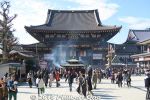
Belonging to the Shingon Buddhist sect founded by Kobo Daishi, Kawasaki Daishi Temple is one of the Kanto Region's Big Three Shingon temples (other two being Narita-san in Chiba and Yakuoin in Mt. Takao).Officially named Heikenji Temple, Kawasaki Daishi worships Kobo Daishi (弘法大師), the founder of the Shingon Sect.
|
|
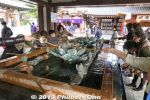
Water basin with a lotus flower.
|
|

Ema tablet for the Year of the Boar in 2019.
|
|

Kawasaki Daishi Temple, Dai-hondo main worship hall and incense burner in front. 大本堂
|
|
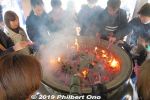
Incense burner
|
|
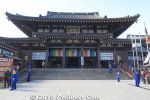
Kawasaki Daishi Temple, Dai-hondo main worship hall 大本堂
|
|
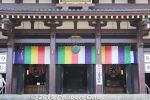
Kawasaki Daishi Temple, Dai-hondo main worship hall 大本堂
|
|

Kawasaki Daishi Temple, Dai-hondo main worship hall 大本堂
|
|

Kawasaki Daishi Temple, Dai-hondo main worship hall 大本堂
|
|
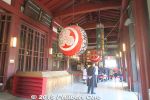
Kawasaki Daishi Temple, Dai-hondo main worship hall 大本堂
|
|
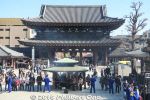
View from the Dai-hondo main hall.
|
|
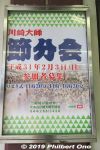
Feb. 3, 2019 was Setsubun, the traditional day marking the start of spring even though it's still cold as winter.
|
|
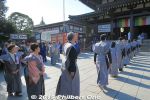
Setsubun started with a religious ceremony inside the main temple at about 1:15 pm. The priests and bean throwers paraded into the temple.
|
|
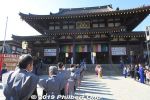
節分会
|
|
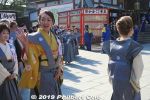
This is actress Kanda Uno waving. Setsubun at major temples usually have a few celebrities. 神田うの
|
|
|

Temple priests standing by to enter the temple.
|
|
|
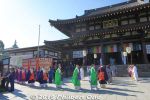
Priests proceed to the main temple.
|
|

They did the goma fire ritual inside the temple where they burn wooden tablets to cleanse your soul.
|
|
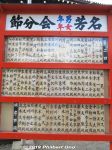
Names of the Setsubun bean throwers on Feb. 3, 2019 at Kawasaki Daishi.
|
|

After the religious ceremony, group photo of the priests (head priest in the middle wearing orange) and bean throwers.
|
|

To be a Setsubun bean thrower, you have to pay money to the temple. Kawasaki Daishi charges ¥70,000.It includes a nice lunch and a few auspicious souvenirs like a wooden goma prayer tablet, wooden box of lucky beans, folding fan, and sake.
|
|

Group photo of Setsubun bean throwers on Feb. 3, 2019 at Kawasaki Daishi. The head priest is in orange in the middle.
|
|

After the picture-taking, everyone walked to the bean-throwing area.
|
|
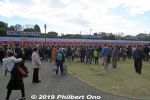
On Feb. 3, 2019, Kawasaki Daishi held the Setsubun bean-throwing three times at 11:30 am, 2 pm, and 4:30 pm. I went at 2 pm. This is the temple's lawn named Yasuragi Hiroba. やすらぎ広場
|
|

Kawasaki Daishi Temple grounds is quite large. It has this large field near the main worship hall. Perfect for bean throwing.
|
|
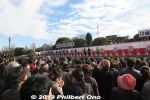
About 7,000 people gathered for each of the three bean-throwing ceremonies. It's free for people to catch the beans.
|
|
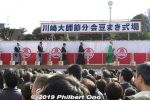
Led by priests, the bean throwers entered the site on an elevated platform. 節分会・豆まき
|
|

Of course, the temple needs to take care of some expenses such as those gifts and constructing this platform for the bean throwers. 節分会・豆まき
|
|
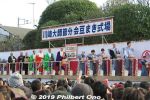
Kawasaki Daishi has about 70 people throwing beans each time, so a total of 210 people for the day. ¥70,000 x 210 = ¥14,700,000 income for the temple this day.
|
|

Everyone is filled with anticipation to catch lucky beans.
|
|
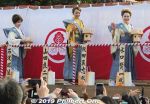
Kanda Uno (center) and Dewi Sukarno (right) were the main celebrities throwing beans. They weren't born in the Year of the Boar, but Uno is a native of Kawasaki. Dewi must also have some connection with this temple or Kawasaki.
|
|

川崎大師節分会 豆まき
|
|

Front and center are the Kawasaki Daishi Temple priests.
|
|

At 2 pm, the fun began when they started throwing the beans.
|
|

Setsubun at Kawasaki Daishi Temple. They threw small plastic bags of beans, so they were easy to catch.
|
|
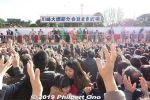
All hands in the air. Setsubun bean-throwing at Kawasaki Daishi Temple on Feb. 3, 2019. 川崎大師節分会 豆まき
|
|
|
|
|
|
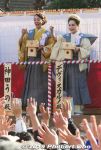
Kanda Uno and Dewi Sukarno throwing Setsubun beans at Kawasaki Daishi on Feb. 3, 2019. Dewi was one of the wives of the first President of Indonesia, Sukarno. She's now a popular celebrity in Japan. 神田うの デヴィ夫人
|
|
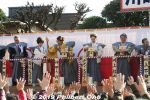
Kanda Uno and Dewi Sukarno throwing Setsubun beans. 川崎大師節分会 豆まき
|
|
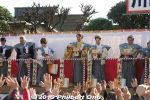
Kanda Uno and Dewi Sukarno throwing Setsubun beans.
|
|
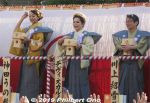
Kanda Uno and Dewi Sukarno throwing Setsubun beans at Kawasaki Daishi on Feb. 3, 2019. 神田うの デヴィ夫人 川崎大師節分会 豆まき
|
|
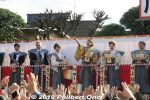
Kanda Uno and Dewi Sukarno throwing Setsubun beans at Kawasaki Daishi. 川崎大師節分会 豆まき
|
|
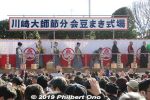
After several minutes, everyone ran out beans. They waved goodbye and left.
|
|
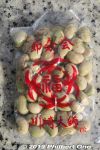
My lucky setsubun beans. It hit my hand in the air and I caught it. I think one of the priests threw it.
|
|
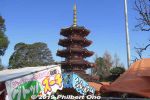
Octagonal 5-story pagoda at Kawasaki Daishi Temple. 八角五重塔 (中興塔)
|
|
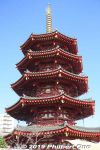
Octagonal 5-story pagoda at Kawasaki Daishi Temple. 八角五重塔 (中興塔)
|
|
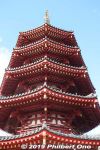
It's a ferro-concrete building with no windows nor observation deck or balcony.
|
|
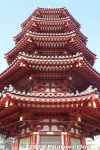
The pagoda symbolizes Dainichi Nyorai (Mahavairocana).
|
|
|
|
|
|
|

The sacred statues or images worshipped in the Octagonal 5-story pagoda.
|
|

About the Octagonal 5-story pagoda.
|
|
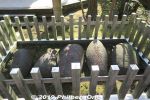
Power stones (chikara-ishi) 力石
|
|
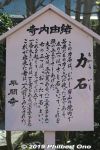
About the Power stones (chikara-ishi) 力石
|
|
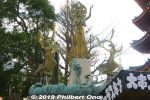
Prayer and Peace Monument 不動門 「祈りと平和」の像
|
|
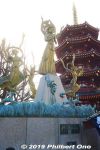
Prayer and Peace Monument 不動門 「祈りと平和」の像
|
|

About Prayer and Peace Monument.
|
|
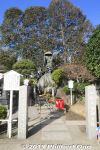
Kobo Daishi statue built in 1973 for the 1,200th anniversary of his birth. 遍路大師尊像
|
|
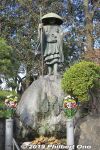
Kobo Daishi statue (Henro Daishi) depicted as a pilgrim on Shikoku. Pour water on the straw sandals to pray for good health and stamina on long treks. 遍路大師
|
|
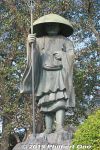
Kobo Daishi statue built in 1973 for the 1,200th anniversary of his birth. Kawasaki Daishi Temple. 遍路大師尊像
|
|
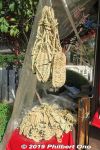
Straw sandals. near Kobo Daishi statue.
|
|
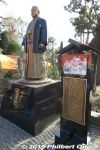
Statue of the late sumo wrestler Yokozuna Kitanoumi (1953–2015) as the chairman of the Japan Sumo Association. He was a member of Kawasaki Daishi Temple..
|
|
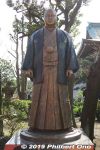
Statue of the late, great Yokozuna Kitanoumi Toshimitsu at Kawasaki Daishi Temple. Erected on the third anniversary of his death by his family. He was only 62. Kitanoumi was one of the greatest yokozuna. 北の湖銅像
|
|
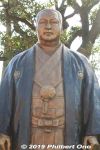
Statue of the late, great Yokozuna Kitanoumi Toshimitsu. I love sumo, but with the premature deaths of great wrestlers like Kitanoumi and Chiyonofuji in recent years, I've been having ambivalent feelings toward sumo because of how it seriously affects the person's health.
|
|

About Kitanoumi.
|
|
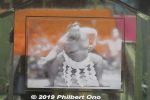
Photo of Kitanoumi as yokozuna.
|
|

About the Road marker.
|
|
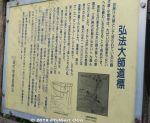
About the Road marker.
|
|
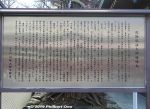
About Kobo Daishi.
|
|
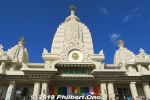
Yakushiden Hall dedicated to Yakushi, the Medicine Buddha. Built in Nov. 2008. 薬師殿
|
|
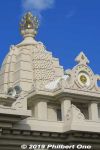
Yakushiden Hall 薬師殿
|
|
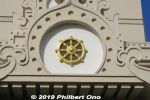
Yakushiden Hall 薬師殿
|
|
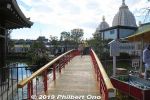
Crossing Yasuragi Bridge over Tsuru-no-Ike Pond. やすらぎ橋
|
|
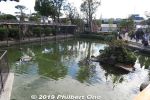
Tsuru-no-Ike Pond つるの池
|
|
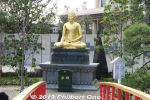
Statue of Gautama Buddha. 降魔成道釈迦如来像
|
|
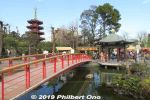
Yasuragi Bridge over Tsuru-no-Ike Pond. It dispels evil and brings good fortune. やすらぎ橋
|
|
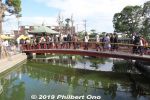
Yasuragi Bridge over Tsuru-no-Ike Pond. やすらぎ橋
|
|
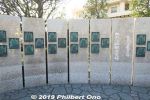
Nihon Hyaku Kannon Reijo Osunafumi Sanpaijo (Sand Stepping Worship Field of Hundred Kannon Temple of Japan). Sand from 100 Kannon temples in Japan are here. 日本百観音霊場お砂踏み参拝所
|
|
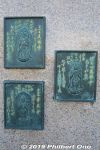
Japan's 100 Kannon Buddhas in relief.
|
|
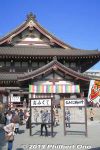
Side of the main hall.
|
|
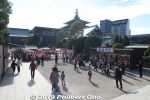
Ahead is the temple office and Shinto Kaikan (Followers Hall) on the right. 信徒会館
|
|
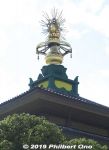
Rooftop jewel on Shinto Kaikan (Followers Hall). 信徒会館
|
|
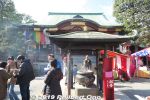
Incense burner in front of Fudodo Hall dedicated to Fudo Myo-o. 不動堂
|
|
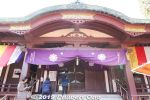
Fudodo Hall dedicated to Fudo Myo-o. 不動堂
|
|
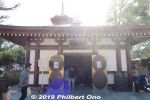
On the way to the main hall is this Kyozo Sutra Repository. (経蔵)
|
|

About the Kyozo Sutra Repository. (経蔵)
|
|
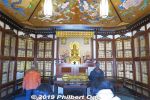
Inside Kyozo Sutra Repository. Stores 7,240 books of Kenryuban Daizokyo. Built in 2004. (経蔵)
|
|

Statue of Shaka Nyorai in the Kyozo.
|
|
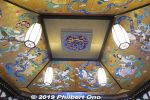
Inside Kawasaki Daishi's Kyozo Sutra Repository, Buddhist paintings on four sides on the ceiling. Tells the story of how Buddhism came to Japan from India via China and Korea.
|
|

Inside Kawasaki Daishi's Kyozo Sutra Repository, Buddhist painting on the ceiling.
|
|
|
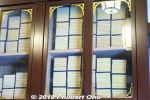
Some of the 7,240 books of Kenryuban Daizokyo.
|
|
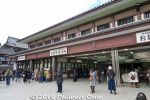
Ogoma Uketsukejo is where you can sign up for a goma tablet burning ceremony in the main hall. お護摩受付所・護持志納受付所
|
|
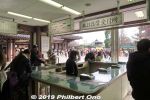
Ogoma Uketsukejo is where you can sign up for a goma tablet burning ceremony in the main hall. お護摩受付所・護持志納受付所
|
|

Goma wooden tablets for sale, ¥5,000 to ¥30,000. The Goma kito fire prayer to burn these prayer tablets is held a few times every morning and afternoon in the main hall. 護摩札
|
|
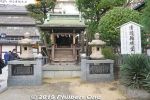
Seiryu Gengon-do Hall 清瀧権現堂
|
|
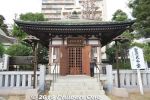
Shotoku Taishi-do Hall dedicated to Prince Shotoku Taishi. 聖徳太子堂
|
|
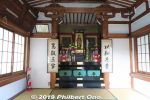
Inside Shotoku Taishi-do Hall dedicated to Prince Shotoku Taishi. 聖徳太子堂
|
|
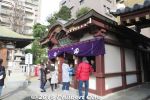
Used ema tablet and amulet disposal place. They will be burned. 納札殿
|
|
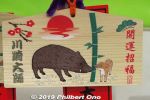
Ema tablet for 2019, Year of the Boar.
|
|
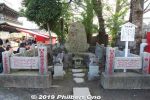
Mari-zuka Monument built in May 1960. Festival is held every May 21 when famous enetertainers perform on a stage. まり塚碑
|
|
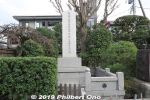
Kawasaki Daishi Temple has many monuments. This monument marks Kobo Daishi's 1,150th anniversary of his death.
|
|
|
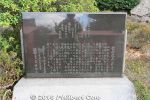
Monument for a poem about Kobo Daishi from Sept. 1986.
|
|
|
|
|
|
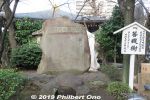
Iroha Monument on the left and commemorative tree on the right.
|
|
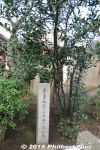
Tree planted by Princess Mikasa.
|
|
|
|
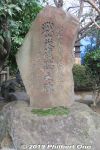
War Recovery Memorial from 1974.
|
|
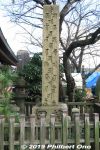
Looks Korean.
|
|
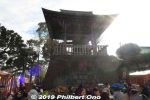
Bell tower rung a few times a year, especially on New Year's Eve. 鐘楼堂
|
|
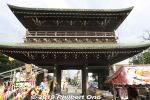
Side gate called Fudomon. It used to be the temple's main gate from 1948 to 1977 (when the current main gate was rebuilt) which was lost during World War II. 不動門
|
|
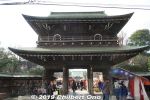
Side gate called Fudomon, as seen from outside. 不動門
|
|

About the Fudomon Gate.
|
|
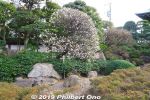
Plum blossoms.
|
|
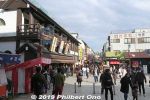
Back to Daishi Nakamise.
|
|
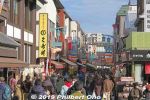
Daishi Nakamise shopping path return trip.
|
|
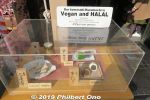
Vegan and halal food.
|
|
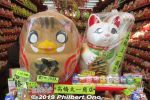
Boar daruma and beckoning maneki-neko cat.
|
|

Daruma and maneki neko
|
|
|
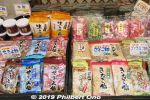
Lots of hard candy.
|
|

Daishi Nakamise is famous for rock-candy cutting (Tontoko Ame). They use a knive to cut the long sliver of candy on a wooden cutting board to make a loud chopping noise.op, always banging the knife
|
|
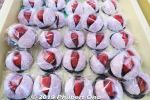
Ichigo-daifuku
|
|
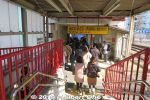
Kawasaki Daishi Station on the Keikyu Line.
|
|
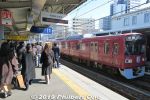
Kawasaki Daishi Station on the Keikyu Line.
|
|
|
|
|
|
|













































































